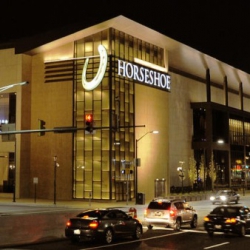The Horseshoe Baltimore continues to trail revenue projections by a considerable amount. The states five casinos collected $85.6 million in December 2014, but if one excludes the Horseshoe Casino Baltimore, the revenues actually declined by 3.6% from one December to the next. The total decline in real numbers was $232 million.
The other four casino operators would say that decline was expected, since they naturally lost customers to the Horseshoe Casino in Baltimore, which opened in August 2014. That was one of the arguments local gaming operators used to fight against a proposed Baltimore casino, that such an operation would cannibalize the customer base of the existing gaming businesses. Proponents of the casino were vindicated, though, because the state’s land-based gaming industry raked in a 31% higher revenue in December 2014 than it did in December 2013 (if you include the Horseshoe).
Horseshoe Casino’s December Numbers
The Horseshoe Casino brought in $22.9 million in December, which was down slightly from the $23.4 million it brought in in November 2014. The casino has seen a small incremental increase since it’s opening, though the projections had the casino collecting 35% more revenues.
According to a state-commissioned study by Cummings Associates, the casino was supposed to generate $328 million in revenue per year, or about $31 million in revenue each month. In its first five months of operation, the Horseshoe has not been able to hit $31 million at any time.
Maryland Live December Revenues
Maryland Live, the state’s largest and most successful casino, generated $50.2 million in revenue in December 2014. Though that is 4.4% less than it generated in December 2013, Maryland Live still collects more than half of the state’s land-based gaming revenue each month.
Maryland Live is a $500 million multi-use complex located at Arundel Mills Mall in Hanover, Maryland. The casino continues to outperform Horseshoe Baltimore, despite the newer casino’s location in a larger population center. The Horseshoe still has to build up a larger player database, despite having access to its owner’s player database. The Horseshoe is owned by Caesars Entertainment, the massive American gaming company best known for Caesars Palace casino resort on the Las Vegas Strip.
Rocky Gap Casino Numbers
Rocky Gap Casino Resort, found in Western Maryland, is the only casino which saw an increase in revenues from last December. Its $3.07 million revenue represented a 17.1% increase from last year at this time. Rocky Gap has a small enough revenue stream that one or two high rollers can significantly affect its numbers each month.
Hollywood Casino – Ocean Downs
Hollywood Casino Perryville collected more than $6 million in revenue in December, though that represents a 7% decrease from last year at the same time. The Casino at Ocean Downs collected $3.7 million, which is about 0.7% less than it raked during December 2013.
Horseshoe Casino Taxes
City officials in Baltimore had hoped to collect $14.6 million from the Horseshoe Baltimore in the fiscal year, which ends in June 30, 2015. Of that money, $13.2 million was earmarked for property tax relief to the city’s property owners. The remaining $1.4 million was to be saved for school construction programs.
Last month, city officials said they only plan to collect about $8 million of that cash. That’s minimum tax level agreed upon when the city and the developers agreed on annual ground lease payments. Those payments are determined by a percentage of revenue generated by the casino, which sits in South Baltimore. Of that money, $7.2 million is set for property tax relief. Meanwhile, the city is facing a $14.8 million budget deficit.
One reason Maryland casinos are under-performing is the saturation of the market. The gaming industries in nearby states have also experienced trouble. New Jersey is the most notable of the states having trouble, though Delaware’s legislators are also having to find ways to save their local gaming industry.

